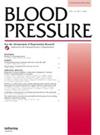Cardiovascular rEmodelling in living kidNey donorS with reduced glomerular filtration rate: rationale and design of the CENS study
IF 2.3
4区 医学
Q2 PERIPHERAL VASCULAR DISEASE
引用次数: 1
Abstract
Abstract Purpose: Until recently, it has been believed that donating a kidney not represents any risk for development of cardiovascular disease. However, a recent Norwegian epidemiological study suggests that kidney donors have an increased long-term risk of cardiovascular mortality. The pathophysiological mechanisms linking reduced kidney function to cardiovascular disease are not known. Living kidney donors are screened for cardiovascular morbidity before unilateral nephrectomy, and are left with mildly reduced glomerular filtration rate (GFR) after donation. Therefore, they represent an unique model for investigating the pathogenesis linking reduced GFR to cardiovascular disease and cardiovascular remodelling. We present the study design of Cardiovascular rEmodelling in living kidNey donorS with reduced glomerular filtration rate (CENS), which is an investigator-initiated prospective observational study on living kidney donors. The hypothesis is that living kidney donors develop cardiovascular remodelling due to a reduction of GFR. Materials and methods: 60 living kidney donors and 60 age and sex matched healthy controls will be recruited. The controls will be evaluated to fulfil the Norwegian transplantation protocol for living kidney donors. Investigations will be performed at baseline and after 1, 3, 6 and 10 years in both groups. The investigations include cardiac magnetic resonance imaging, echocardiography, bone density scan, flow mediated dilatation, laser Doppler flowmetry, nailfold capillaroscopy, office blood pressure, 24-h ambulatory blood pressure, heart rate variability and investigation of microbiota and biomarkers for inflammation, cardiovascular risk and the calcium-phosphate metabolism. Conclusions: The present study seeks to provide new insight in the pathophysiological mechanisms linking reduced kidney function to cardiovascular disease. In addition, we aim to enlighten predictors of adverse cardiovascular outcome in living kidney donors. The study is registered at Clinical-Trials.gov (identifier: NCT03729557).肾小球滤过率降低的活体肾脏供者的心血管重构:CENS研究的基本原理和设计
摘要目的:直到最近,人们还认为捐献肾脏并不代表任何心血管疾病的风险。然而,挪威最近的一项流行病学研究表明,肾脏捐献者心血管死亡的长期风险增加。将肾功能下降与心血管疾病联系起来的病理生理机制尚不清楚。活体肾脏捐献者在单侧肾切除术前进行心血管疾病筛查,捐献后肾小球滤过率(GFR)轻度降低。因此,它们代表了一个独特的模型来研究肾小球滤过率降低与心血管疾病和心血管重塑之间的发病机制。我们提出了在肾小球滤过率降低的活体肾脏捐献者(CENS)中进行心血管建模的研究设计,这是一项由研究者发起的对活体肾脏捐献者的前瞻性观察性研究。假设活体肾脏捐献者由于肾小球滤过率降低而发生心血管重塑。材料和方法:将招募60名活体肾脏捐献者和60名年龄和性别匹配的健康对照。将对对照进行评估,以满足挪威活体肾脏捐献者的移植方案。两组患者将在基线和1年、3年、6年和10年后进行调查。研究包括心脏磁共振成像、超声心动图、骨密度扫描、流量介导的扩张、激光多普勒流量计、甲襞毛细血管镜检查、办公室血压、24小时动态血压、心率变异性以及微生物群和炎症生物标志物、心血管风险和磷酸钙代谢的研究。结论:本研究旨在为肾功能下降与心血管疾病的病理生理机制提供新的见解。此外,我们的目的是启发活体肾脏捐献者不良心血管结局的预测因素。该研究在Clinical-Trials.gov上注册(标识符:NCT03729557)。
本文章由计算机程序翻译,如有差异,请以英文原文为准。
求助全文
约1分钟内获得全文
求助全文
来源期刊

Blood Pressure
医学-外周血管病
CiteScore
3.00
自引率
5.60%
发文量
41
审稿时长
6-12 weeks
期刊介绍:
For outstanding coverage of the latest advances in hypertension research, turn to Blood Pressure, a primary source for authoritative and timely information on all aspects of hypertension research and management.
Features include:
• Physiology and pathophysiology of blood pressure regulation
• Primary and secondary hypertension
• Cerebrovascular and cardiovascular complications of hypertension
• Detection, treatment and follow-up of hypertension
• Non pharmacological and pharmacological management
• Large outcome trials in hypertension.
 求助内容:
求助内容: 应助结果提醒方式:
应助结果提醒方式:


